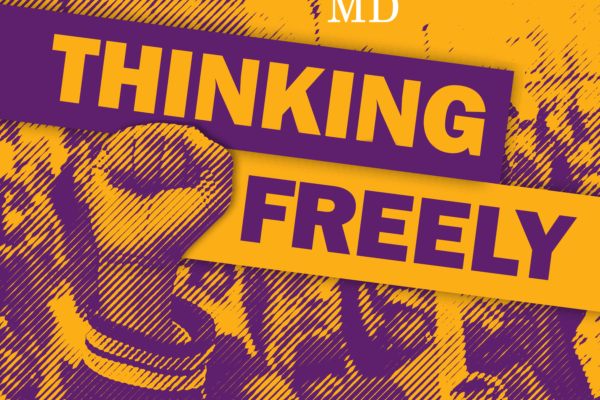BALTIMORE, MD – The third episode of Thinking Freely, “Taking Back Our Voting Rights from Jim Crow,” features a powerful discussion about restoring the vote to all of our citizens and realizing the positive impact this could bring to our communities and democracy here in Maryland. Featuring Lupé Hawkins of Just Us and Yanet Amanuel of the ACLU of Maryland, this month’s episode focuses on the voter restoration movement, counters misinformation about voting rights, and makes clear why people who are incarcerated should retain their fundamental right to vote.
Thinking Freely focuses on the latest issues in Maryland, like last month’s episode on First Amendment rights violations and police abuse. In this month’s episode, Amber Taylor, host and producer of Thinking Freely, and the featured guests discuss the importance of universal suffrage and the impact it would have for our democracy and for the political power of Black and Brown Marylanders.
Lupé Hawkins is a Marylander who was formerly incarcerated. Mr. Hawkins understands the importance of every citizen’s vote, which is why he became a leader in the organization, Just Us. Mr. Hawkins said: “A lot of people that are incarcerated will be coming home. It’s just as important for them to vote as a person who hasn’t been incarcerated. It’s our community.”
This week, September 24, was national voter registration day, and a reminder that voting is a key part of participating in our democracy. Amber Taylor said: “Just because you were involved in the criminal justice system does not have to mean you should have your rights taken away. The idea of not allowing those who are incarcerated to vote is rooted in a racist Jim Crow past.”
Not allowing people who are incarcerated or formerly incarcerated to vote did not exist before Jim Crow segregationist laws. As part of a white supremacist system, voter disenfranchisement laws were intentionally designed to block the political power of Black and Brown citizens. But it does not have to – and should not – be that way: In countries like South Africa, Spain, and Canada, people who are incarcerated retain their right to vote. Our future can be one where all citizens can vote and participate in our democracy.
“Voting makes you feel human,” said Mr. Hawkins. “Voting can change what’s going on in the community around you.”
While currently people who are incarcerated for felonies in Maryland cannot vote, Marylanders who are formerly incarcerated, or who are currently incarcerated for non-felonies, can vote. Yanet Amanuel, public policy advocate with ACLU, said: “There’s a lot of misinformation out there. We were outside parole and probations offices, registering people to vote. And we found that a lot of individuals simply did not know they could vote. It’s not that they didn’t have the interest. It’s that they simply didn’t know that they had the ability to cast the ballot. And it wasn’t just them that didn’t know. It was their family members, parole probation officers themselves, and poll workers who were misinformed.”
Thinking Freely is intentional about informing Marylanders about what is happening locally in politics, and then giving them ways to take action and become more active members in the community, advocating for a better tomorrow.
We hope that you can listen in to this episode of Thinking Freely, to learn about what we as Marylanders can do to get involved in turning the idea of universal suffrage into reality, and help spread the good news that those who are formerly incarcerated can vote! Listen here.
SUBSCRIBE: Thinking Freely is available Google Play, Apple Podcasts, Spotify, SoundCloud, Radio Public, Listen Notes, and Stitcher.
EPISODE 3: Taking Back Our Voting Rights from Jim Crow (EP. 03)
On Constitution Day, Nicole Hansen, director of Out for Justice, spoke about her work on restoring votes. “Individuals with felony convictions, no matter how many they have, have the right to vote,” said Ms. Hansen. “We got our incarcerated citizens ballot. We brought the ballot back to the institution. And our incarcerated citizens were able to cast their vote. And we were able to serve over 83 incarcerated citizens over the last election.”
###
Stay Informed
Sign up to be the first to hear about how to take action.
By completing this form, I agree to receive occasional emails per the terms of the ACLU’s privacy statement.
By completing this form, I agree to receive occasional emails per the terms of the ACLU’s privacy statement.

